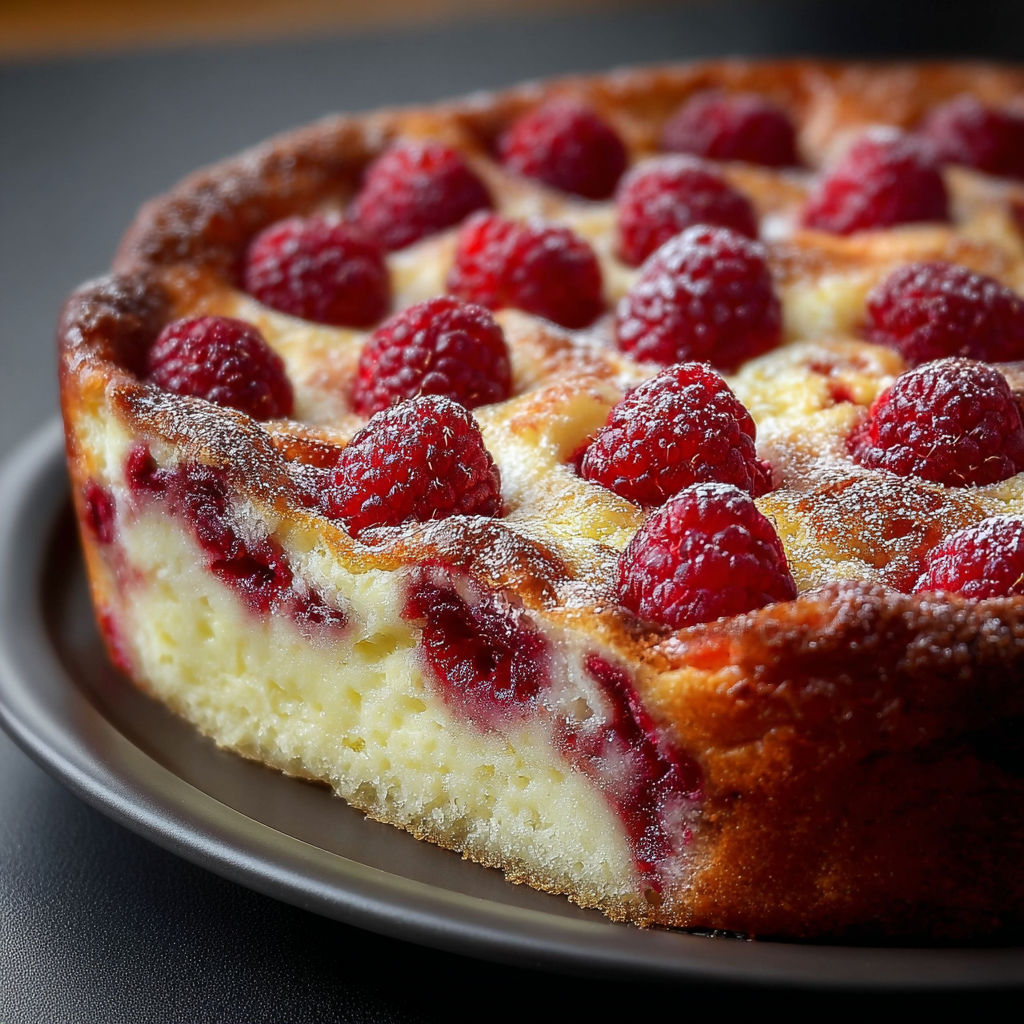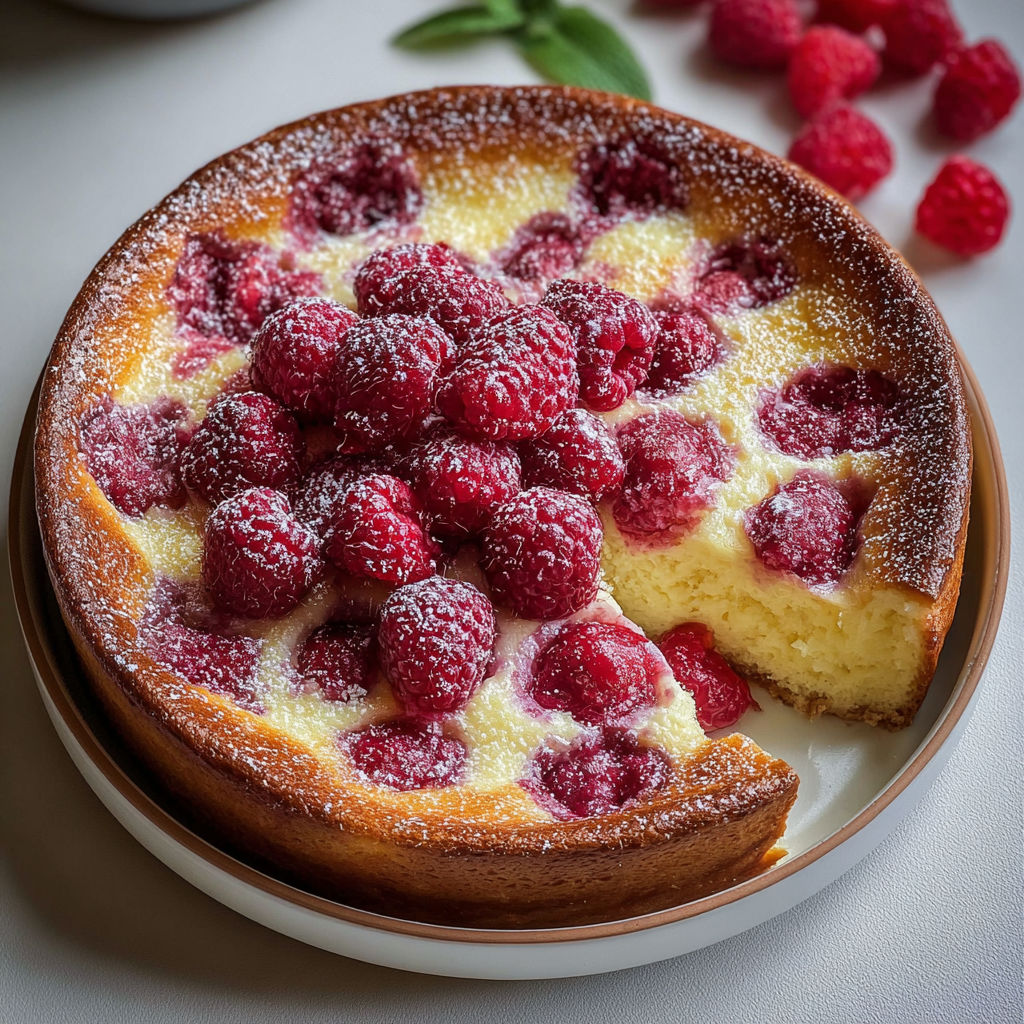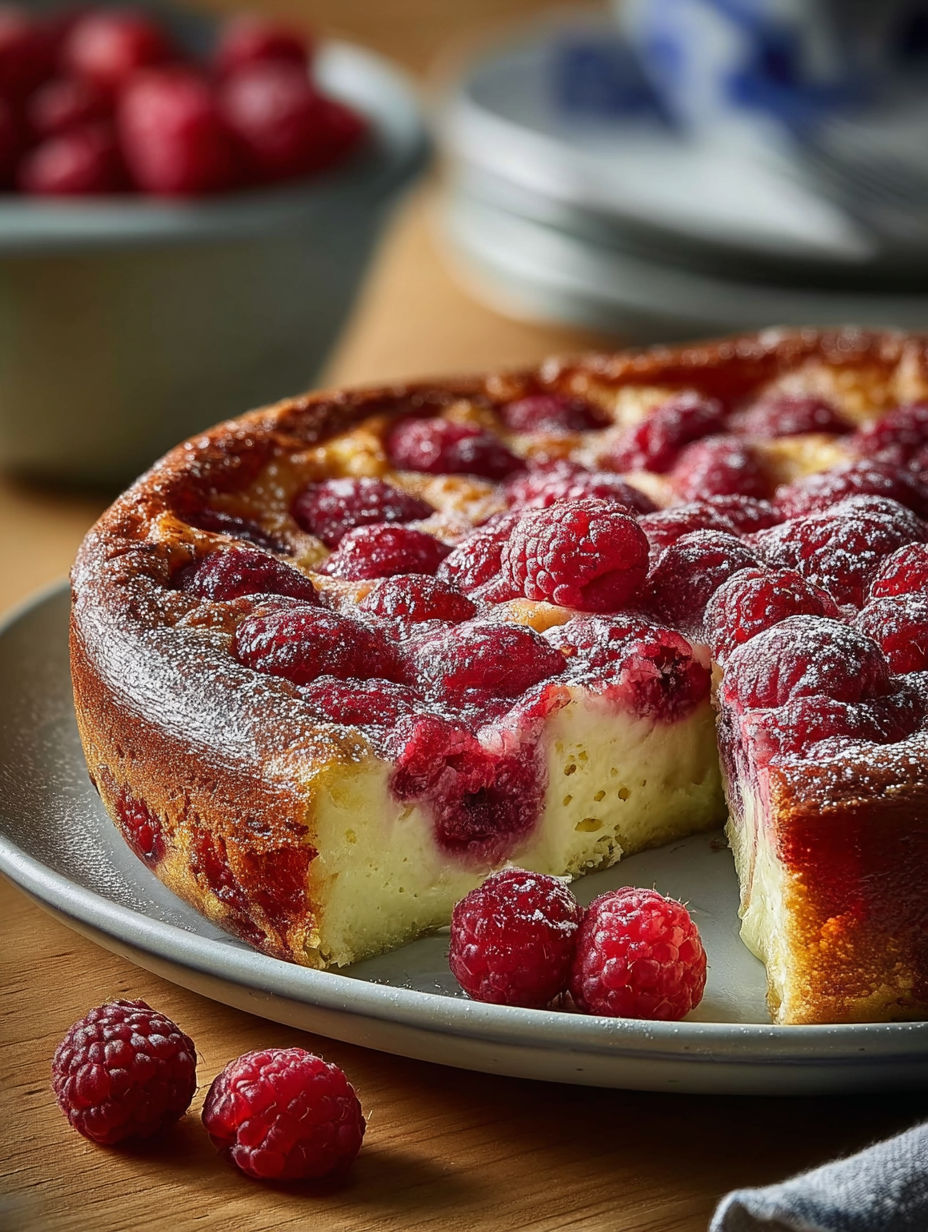 Pin
Pin
This classic French raspberry clafoutis brings the essence of summer to your table with minimal effort. The delicate custard base cradles juicy raspberries for a dessert that's impressive yet simple enough for weeknight baking. I've perfected this recipe through countless dinner parties where guests always request the recipe before leaving.
The first time I made this clafoutis was for a last-minute dinner party. I was panicking about dessert until I remembered my grandmother's simple recipe that always impressed. That improvised dessert became my signature dish, requested at every family gathering since.
- 500g fresh raspberries for their perfect balance of sweetness and acidity
- 125g all-purpose flour creates the perfect custard texture
- 125g granulated sugar provides just enough sweetness without overpowering the berries
- 4 whole eggs give structure and richness to the custard
- 250ml whole milk ensures a creamy base
- 50ml heavy cream adds luxurious texture
- 1 teaspoon vanilla extract enhances the natural flavors
- Pinch of salt balances the sweetness
- Butter for greasing helps achieve those beautiful caramelized edges
- Powdered sugar for dusting adds the perfect finishing touch
Choose raspberries that are plump and vibrant in color. They should be firm but not hard. If using frozen berries in a pinch, do not thaw them before adding to the batter.
How To Make Easy Raspberry Clafoutis
- Preheat Your Oven
- Heat your oven to 180°C (356°F). A properly preheated oven is crucial for the clafoutis to rise evenly and develop those beautiful golden edges that add texture to each bite.
- Prepare Your Baking Dish
- Generously butter a 24-26cm round baking dish. Be thorough with the butter, especially around the edges and up the sides. This prevents sticking and adds flavor to the caramelized edge pieces that many consider the best part.
- Mix Dry Ingredients
- In a large bowl, thoroughly combine the flour, sugar, and salt. Whisk together until completely integrated to prevent flour pockets in your finished clafoutis. The salt may seem minimal but plays a crucial role in enhancing the sweetness.
- Beat The Eggs
- In a separate bowl, whisk the eggs until they become slightly frothy. This incorporates air into the batter which helps create the perfect custardy texture. Take your time with this step as it affects the final consistency.
- Create The Batter
- Add the beaten eggs to your flour mixture, gently folding until just combined. Then gradually pour in the milk while constantly stirring to prevent lumps from forming. Follow with the cream and vanilla extract, mixing until you have a smooth batter with the consistency of thick cream.
- Arrange The Raspberries
- Place your raspberries in the buttered dish, distributing them evenly. Some prefer to fold the berries into the batter, but placing them in the dish first allows them to float naturally throughout the custard as it bakes.
- Pour And Bake
- Gently pour the batter over the raspberries. The berries will float up slightly which is exactly what you want. Bake for 35-40 minutes until the edges are golden brown and the center is just set but still has a slight wobble when gently shaken.
- Rest And Serve
- Allow the clafoutis to rest for 10-15 minutes before serving. This resting period allows the custard to set properly. Dust with powdered sugar just before bringing to the table for that classic presentation.
My grandmother always said the secret to a perfect clafoutis is patience when mixing the batter. She would count to thirty while slowly incorporating the milk, insisting this gentle approach prevented the dreaded tough texture that comes from overworking the flour.

The History Behind Clafoutis
Clafoutis originated in the Limousin region of France where it was traditionally made with black cherries. The name comes from the word "clafir" which means "to fill" in the local dialect, referring to how the fruit fills the batter. While purists insist a true clafoutis can only be made with cherries, modern variations with other fruits are widely accepted and called "flaugnarde" in some regions. This raspberry version maintains the essence of the classic while taking advantage of summer's berry bounty. In my family, we've been making this variation since my great-grandmother discovered her cherry trees had failed one summer and raspberries were all she had on hand.
Storage Tips
Your clafoutis will keep in the refrigerator for up to three days, though the texture is best within the first 24 hours. Store it covered with plastic wrap once completely cooled. To reheat, place in a 300°F oven for about 10 minutes until just warmed through. Avoid the microwave as it can make the texture rubbery. If you notice any weeping or separation after storage, simply blot gently with a paper towel before reheating.
Seasonal Variations
While raspberries create a stunning summer clafoutis, this versatile recipe adapts beautifully to the seasons. In early summer, try sweet cherries for the traditional version. Late summer calls for plums or blackberries. Fall brings opportunities for thinly sliced apples or pears lightly tossed with cinnamon. Winter versions can incorporate poached quince or even cranberries with orange zest for holiday gatherings. The basic batter remains your constant companion throughout the year.

Recipe FAQs
- → Comment savoir si mon clafoutis aux framboises est bien cuit ?
Le clafoutis est prêt lorsqu'il est légèrement doré sur le dessus et qu'il a gonflé. Pour vérifier la cuisson, insérez la pointe d'un couteau au centre - elle doit ressortir propre ou très légèrement humide. Le centre doit être ferme mais garder une texture moelleuse. Comptez environ 30-35 minutes de cuisson à 180°C.
- → Peut-on utiliser des framboises surgelées pour ce clafoutis ?
Oui, vous pouvez utiliser des framboises surgelées si les fraîches ne sont pas disponibles. Ne les décongelez pas avant utilisation pour éviter qu'elles ne rendent trop d'eau. Ajoutez-les directement dans le moule encore congelées et prolongez légèrement le temps de cuisson (environ 5 minutes supplémentaires) car les fruits froids ralentissent la cuisson.
- → Comment servir et conserver ce clafoutis aux framboises ?
Servez le clafoutis tiède ou à température ambiante, saupoudré de sucre glace. Il peut être accompagné d'une boule de glace à la vanille ou d'un peu de crème fraîche. Pour la conservation, gardez-le au réfrigérateur jusqu'à 2 jours dans un contenant hermétique. Vous pouvez le réchauffer quelques minutes au four pour retrouver sa texture moelleuse.
- → Peut-on remplacer ou ajouter d'autres fruits dans ce clafoutis ?
Absolument ! Le clafoutis s'adapte à de nombreux fruits. Vous pouvez mélanger les framboises avec des mûres, des myrtilles ou des groseilles. Pour une version plus douce, essayez avec des pêches ou des abricots coupés en morceaux. Le clafoutis traditionnel est préparé avec des cerises non dénoyautées, qui apportent un parfum d'amande durant la cuisson.
- → Comment obtenir un clafoutis bien moelleux ?
Pour un clafoutis parfaitement moelleux, veillez à ne pas trop cuire la préparation. L'ajout de crème liquide dans la recette contribue également à sa texture fondante. Laissez reposer la pâte 15-20 minutes avant de la verser sur les fruits, cela permet à la farine de bien s'hydrater. Enfin, sortez le clafoutis du four dès qu'il est cuit - un léger frémissement au centre est idéal pour une texture crémeuse.
- → Quelle est la différence entre un clafoutis et une tarte aux fruits ?
Le clafoutis se distingue de la tarte par l'absence de pâte brisée ou sablée comme base. C'est un dessert à mi-chemin entre le flan et le gâteau, avec une texture crémeuse et moelleuse. Les fruits sont directement intégrés dans l'appareil ou disposés au fond du moule avant d'être recouverts de pâte, alors qu'une tarte présente généralement les fruits sur une base de pâte cuite.
